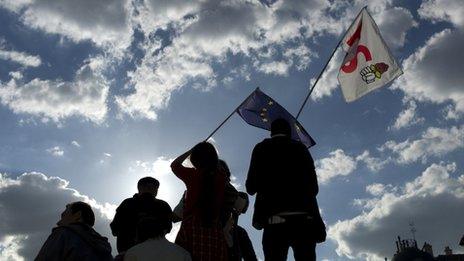Press unease at Europe's anti-austerity swing
- Published
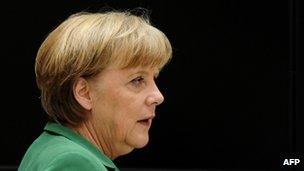
German Chancellor Angela Merkel risks appearing isolated soon when Nicolas Sarkozy leaves office
Press commentators across Europe are coming to terms with elections in France, Greece and Italy which saw big gains for left-wing politicians.
The success of anti-austerity campaigns is viewed as a blow to German Chancellor Angela Merkel, who lost a key political ally in France's Nicolas Sarkozy.
And the surge of the radical left Syriza coalition in Greece has raised fresh doubts about the country's international credit lifeline.
GERMANY
Editorial in Germany's biggest-selling paper Bild
The euro is shaking again after the chaos-election in Greece. The change of the guard in France has robbed Angela Merkel of her most important partner... What now, Mrs Merkel?
Berthold Kohler in Frankfurter Allgemeine Zeitung
Berlin and Paris must quickly find a new way of co-operating, the crisis won't wait. The result of the election in Greece is a new aggravation: what do the rescuers do, if those they are trying to rescue don't want to be rescued?
Alexander Hagelueken in Munich's Sueddeutsche Zeitung
It's relatively simple: Greece needs a government, if necessary after more elections, which continues with the cuts. Otherwise the helpers will shut off the money, and Athens is officially bust. No-one should be pleased: It will cost German firms orders and will be expensive for the German taxpayer - and could infect Portugal or Spain. The European partners must now think about how they can support growth in Greece.
Gerd Appenzeller in Berlin's Der Tagesspiegel
Both results [in France and Greece] could be a problem for Angela Merkel's Europe strategy, which is based on financial solidity... If the international financial markets start to lose confidence in France, the second strongest industrial nation in the EU, then that will weaken the euro. And Germany alone will not be able to stabilise it.
FRANCE
Erik Izraelewicz in Le Monde
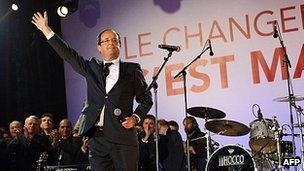
President-elect Francois Hollande is now under the scrutiny of France's EU partners
To negotiate with the rest of Europe, France must quickly demonstrate its willingness and its ability to reduce its debt and deficit. Even if he finally achieves a reorientation of Europe, Francois Hollande cannot turn things around overnight.
Nicolas Demorand in Liberation
The terms of debate are clearly set and Francois Hollande, not yet sworn in, is already cornered: Could France influence Berlin's consensus or has she already lost the necessary authority in Europe? The upcoming five-year period will be played and judged by this issue, which goes far beyond the borders of our country.
Pierre Rousselin in Le Figaro
The [fiscal] pact will be ratified as it is by the [German] Bundestag. It will take effect... when 12 countries of the eurozone have ratified it, whether France honours its signature or not... [Hollande's] supporters should stop taking their wishful thinking for reality.
GREECE
Nikos Konstandaras in English-language Kathimerini
The Greeks voted with their eye on yesterday and they opened the door to tomorrow.... Yesterday's elections destroyed the political system of the past 38 years. They opened the way for new forces and showed the need for co-operation, both before the elections and after. If our politicians and all those who are involved in public life did not learn their lesson yesterday, we will fall into a cycle of conflict that will only end in catastrophe.
Editorial in Kathimerini
"It is obvious that pro-European powers will fight the battle with great disadvantages... If we go to elections under these circumstances, the prevalence of [Syriza leader] Mr Tsipras and the extreme anti-memorandum [Greek bailout] bloc is certain.... Whoever remains silent or inactive will face history and their share of responsibility for what will follow."
ITALY
Sergio Romano in Corriere della Sera
There is within the European Union an opposition party comprising a broad sweep of movements, too different to march together, yet sufficiently numerous to make life difficult for those whose job it is going to be to run their respective countries... Europe is not going to emerge acclaimed or triumphant either from these elections or from those scheduled to be held over the next few months - but Europe's enemies will not have succeeded in proving that there is something better in which we should invest our hopes.
SPAIN
Editorial in El Pais
Hollande, the head of the EU's second biggest economy, although in the political minority, can drive the debate of ideas and politics against the dominant neo-liberalism. The new French president also has to understand that most of the other EU member states feel left out by the almighty Berlin-Paris axis. It is necessary that a Europe of all and based on EU institutions comes back.
TURKEY
Sami Kohen in centrist Milliyet
Europe is presenting a picture of political ambiguity and instability... The Socialists [in France] have succeeded in taking over the presidency after 18 years. This is a sign of both the reaction against rightist Sarkozy and a hope for "change" pinned on leftist Hollande.
Roundup compiled by BBC Monitoring, external, which selects and translates news from radio, television, press, news agencies and the internet from 150 countries in more than 70 languages. It is based in Caversham, UK, and has several bureaux abroad. For more reports from BBC Monitoring, click here
- Published28 November 2014
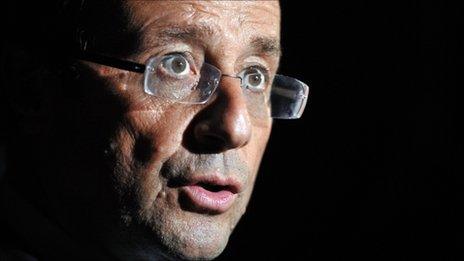
- Published8 May 2012
- Published8 May 2012
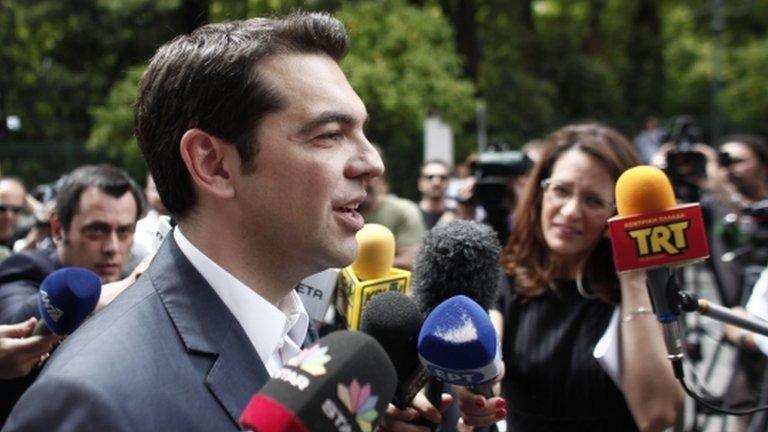
- Published23 May 2012
